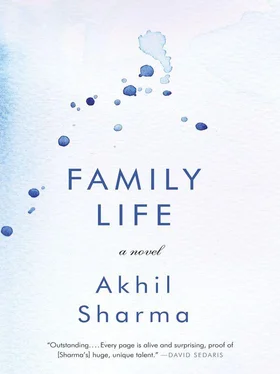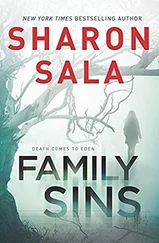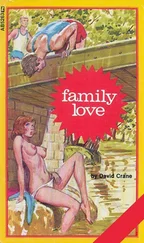I thought Mr. Mehta was strange, but I had heard my mother listen patiently to many strange things.
At the end of Mr. Mehta’s first day, my mother asked him, “Do you notice any difference?” She was standing in the vestibule that the front door opened onto. Mr. Mehta was sitting on the stairs putting on his shoes.
“Everything takes time,” he said. He smiled as if he were a teacher and my mother a nervous student who needed to be calmed and told to be patient.
“But any difference?”
“Don’t worry, ji. We will return your son to you.”
As she stood looking at him, my mother’s face appeared small and meek. It occurred to me that my mother was taking Mr. Mehta seriously. This surprised me. Until that moment, I had thought that we were allowing him into the house because if a potential cure was free and caused no harm, then why not attempt it?
Once Mr. Mehta was gone, my mother perched on the exercise bed and began feeding Birju pureed bananas with a long spoon. Newspapers were spread over his chest. My mother maneuvered the spoon between Birju’s teeth and said, “Eat, baby, eat. Eat, or Ajay will take your food.”
Looking at her, I remembered that earlier in the day, when Mr. Mehta arrived, my mother had been very excited. She had told him, “If you return Birju to how he was, I will sit at your feet the rest of my life.” I had taken this for politeness, since if someone comes to perform a cure and doesn’t ask for money, the least one can do is pretend to believe.
I watched my mother feed Birju. He drooled clots of gray mush. Periodically she wiped his chin with a hand towel. After several minutes, I said, “Mommy, do you think Birju could get better?”
“God can do anything,” she said, keeping her eyes on Birju.
My father came home at six. He stood in Birju’s room drinking tea, sweating lightly. I went and stood beside him. I pressed my head against his waist.
My thoughts were jumbled. Hearing my mother say that Birju could get better had scared me. It had made me feel all alone.
My father smelled a little of hard alcohol being sweated out, something like nail polish remover evaporating. “Full of love are you?” he asked. He patted my head.
A little later, my father and I swung Birju into his wheelchair and rolled him backward into the kitchen, to the head of the kitchen table. My father began to feed Birju a puree of the roti and lentils that we would be eating a little later. Birju took some of the food into his mouth and spat the rest onto his chest. I had seen this many times before, but on the evening of Mr. Mehta’s first visit, I turned my head away.
Most nights, my mother and I played cards. My father would be upstairs in his room and my mother and I sat on either side of Birju’s bed and dealt for three, placing the discards on Birju’s chest and stomach. The television in the corner would play Jeopardy . As we handled the cards, we cheated. We had Birju throw away his best cards. Sometimes we just stole them. That night especially, I felt the need to act very brave. I spoke loudly. I teased Birju. “Pay attention! Playing with you is no fun.” We played until about ten, when the night aide came.
THE NEXT DAY and the day after and the day after that, Mr. Mehta worked diligently, moving briskly around the bed, taking out a leg, rubbing it, tucking it under the sheet, moving to the next leg, then up to an arm. Now and then my mother would send me to Birju’s room with a glass of Coke, which Mr. Mehta drank in gulps.
All morning my mother would stay in the kitchen cooking elaborate lunches for him. The steam cooker would huff, and the pot of oil in which she fried puris would send up waves of heat. The sight of my mother in the kitchen caused my chest to hurt. Her belief that Birju could get better made me feel that she didn’t love us, that she valued believing something ridiculous over taking care of us, that she was willing to let us be hurt so she could have her hope.
One night, my father began shouting at my mother. This was in the kitchen. Birju was in the wheelchair. My father was drunk. His face was lax and his lips wet. “You couldn’t try these cures at the nursing home and so you couldn’t accept that Birju is dead.”
“What are you talking about?” my mother demanded. She was standing at the stove. “You are drunk.”
“Why am I drunk? Tell me — why am I drunk?”
My mother didn’t respond.
“I am so unhappy, and you have no pity for me.”
My mother became irritated. “If I lost a diamond earring,” she hissed, “would I not look everywhere?”
As the days passed, I tried to spend more time with my father. In the evening, when he came home and sat on the radiator in the laundry room taking off his shoes, I boiled his tea. When he went to Birju’s room, I followed with the tea and a plate of biscuits.
My father looked indifferent as he took these from me. I felt that his indifference was my fault, that I should have appreciated him more in the past.
At six thirty, we swung Birju into his wheelchair so that he could get his oral feeding. At eight, my father went upstairs to his and my mother’s room to drink. Though we didn’t talk much, it seemed to me that by making tea and being near him, I was sharing in his thoughts. I wanted us to be close, and so I began believing that we were.
When my father stood quietly in Birju’s room, drinking his tea, I imagined that he was thinking about what he could do to make our life better. When he went upstairs to drink, I saw him choosing to be happy. It was, in my eyes, a mark of sophistication to find a way to be happy in a difficult situation.
In July I turned twelve.
Within a week of Mr. Mehta’s first visit, the phone in the kitchen rang regularly with people who wanted to come and watch him at work. Some of the people who visited we knew. Others were strangers. They stood in Birju’s room and watched the cure like tourists visiting a temple to see an exorcism.
“This is true fire sacrifice,” a man said to my mother in Birju’s room.
My mother said, “What choice do I have?” She looked embarrassed. She knew that the visitors saw her as slightly crazy but they found what she was doing noble and very Indian, and so this made them feel good about being Indian themselves, about going to temple, about doing things such as scolding their children when they got bad grades.
I brought the visitors cups of tea as they watched Birju. I was full of anger and shame as I did this. A few of them pressed dollar bills into my hands.
AT SOME POINT during his third week, Mr. Mehta’s pace began to flag. When I brought him a glass of Coke, he sat down and sipped it slowly as if he were drinking something hot.
One afternoon, I was coming down the stairs when Mr. Mehta called out to me. He was standing by the exercise bed, holding one of Birju’s arms in the air. “Do you ever get headaches?” he asked.
I knew Mr. Mehta wanted me to say yes. Speaking the truth automatically, though, I said, “No.”
“Never?”
I was quiet for a moment. “Sometimes,” I said hesitantly.
Mr. Mehta smiled. “Look at grass. If you spend ten minutes each day looking at something green, you’ll never get headaches.”
After this, whenever I came into Birju’s room, Mr. Mehta would try to strike up a conversation. “Sit for a minute,” he’d say. “Let me finish this.”
I’d sit on a low table next to the hospital bed. Once Mr. Mehta had completed his circuit, he would sit on the hospital bed and talk. One time, he told me that on his first weekend in America, he had gone to a museum of oil production in Titusville, Pennsylvania. He had wanted to see this museum ever since he heard about it in college. “Did you know people used to drink oil because they thought it was good for them? Maybe it’s true. In small doses.”
Читать дальше












